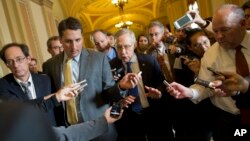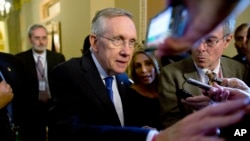CAPITOL HILL —
A bipartisan accord to reopen the U.S. government and avoid a debt default is taking shape in the Senate, as a federal shutdown enters a third week and potential U.S. insolvency looms just days away. The deal is not finalized, and may face significant opposition in the Republican-led House of Representatives.
A way out of America’s fiscal impasse could soon be at hand, according to Senate Majority Leader Harry Reid.
“We have made tremendous progress. We are not there yet. But tremendous progress, and everyone just needs to be patient," said Reid.
The chamber’s Republican Leader, Senator Mitch McConnell, agreed, saying two days of negotiations have yielded results.
“We had a good day yesterday. We had another good day today. I think it is safe to say we have made substantial progress," said McConnell.
News reports say the accord as currently envisioned would fund the federal government into mid-January and extend the U.S. borrowing limit into February, and sets the stage for bicameral budget negotiations from now through mid-December. It is hoped those negotiations would produce a subsequent accord on multiple fiscal matters. Minor changes to President Barack Obama’s signature health care law have neither been agreed to nor ruled out.
Democrats are sounding increasingly confident that a devastating debt default will be averted. Senator Joe Manchin:
“We will not default. I am positive of that. I mean, nothing is a sure thing, but I am as sure as I can be on that one," said Manchin.
Senate Republicans, meanwhile, seem to have abandoned hope of using the nation’s current fiscal deadlines as leverage to block the Affordable Care Act, also known as Obamacare, or to force even greater austerity on the federal budget. Senator Rand Paul said the fiscal impasse must end.
“I think we need to get an agreement and open the government back up," said Paul.
A Senate deal could be finalized later Tuesday. Just how quickly the chamber will be able to vote on the measure depends on whether members refrain from procedural motions and delaying tactics. A leading foe of Obamacare, Republican Senator Ted Cruz, was asked if he plans to object to swift consideration of any deal that emerges.
“We will have to wait to see what the details are," said Cruz.
Even if an accord passes the Senate, it faces an uncertain fate in the House of Representatives. A spokesman for Republican House Speaker John Boehner said any deal approved by the Senate will be reviewed - and possibly altered - in the House. Treasury officials say the United States risks a debt default unless both houses of Congress pass an identical bill raising the borrowing cap by Thursday.
A way out of America’s fiscal impasse could soon be at hand, according to Senate Majority Leader Harry Reid.
“We have made tremendous progress. We are not there yet. But tremendous progress, and everyone just needs to be patient," said Reid.
The chamber’s Republican Leader, Senator Mitch McConnell, agreed, saying two days of negotiations have yielded results.
“We had a good day yesterday. We had another good day today. I think it is safe to say we have made substantial progress," said McConnell.
News reports say the accord as currently envisioned would fund the federal government into mid-January and extend the U.S. borrowing limit into February, and sets the stage for bicameral budget negotiations from now through mid-December. It is hoped those negotiations would produce a subsequent accord on multiple fiscal matters. Minor changes to President Barack Obama’s signature health care law have neither been agreed to nor ruled out.
Democrats are sounding increasingly confident that a devastating debt default will be averted. Senator Joe Manchin:
“We will not default. I am positive of that. I mean, nothing is a sure thing, but I am as sure as I can be on that one," said Manchin.
Senate Republicans, meanwhile, seem to have abandoned hope of using the nation’s current fiscal deadlines as leverage to block the Affordable Care Act, also known as Obamacare, or to force even greater austerity on the federal budget. Senator Rand Paul said the fiscal impasse must end.
“I think we need to get an agreement and open the government back up," said Paul.
A Senate deal could be finalized later Tuesday. Just how quickly the chamber will be able to vote on the measure depends on whether members refrain from procedural motions and delaying tactics. A leading foe of Obamacare, Republican Senator Ted Cruz, was asked if he plans to object to swift consideration of any deal that emerges.
“We will have to wait to see what the details are," said Cruz.
Even if an accord passes the Senate, it faces an uncertain fate in the House of Representatives. A spokesman for Republican House Speaker John Boehner said any deal approved by the Senate will be reviewed - and possibly altered - in the House. Treasury officials say the United States risks a debt default unless both houses of Congress pass an identical bill raising the borrowing cap by Thursday.





